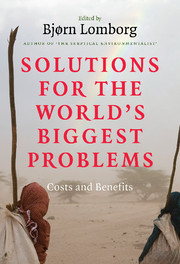Book contents
- Frontmatter
- Contents
- List of figures
- List of tables
- List of contributors
- Acknowledgements
- Introduction
- Part I Economy
- 1 Financial instability
- 2 Lack of intellectual property rights
- 3 Money laundering
- 4 Subsidies and trade barriers
- Part II Environment
- Part III Governance
- Part IV Health and population
- Conclusion: Making your own prioritization
2 - Lack of intellectual property rights
Published online by Cambridge University Press: 08 July 2009
- Frontmatter
- Contents
- List of figures
- List of tables
- List of contributors
- Acknowledgements
- Introduction
- Part I Economy
- 1 Financial instability
- 2 Lack of intellectual property rights
- 3 Money laundering
- 4 Subsidies and trade barriers
- Part II Environment
- Part III Governance
- Part IV Health and population
- Conclusion: Making your own prioritization
Summary
Describing the problem: weak IPR
Many developing countries, including certainly the poorest economies, do not adequately protect intellectual property rights (IPR). While laws and regulations may offer comprehensive protection on paper, the ability and willingness of governments to enforce patents, copyrights, plant variety rights and trademarks are almost completely absent. In part this situation reflects simple political economy: the vast majority of firms who own IPR in poor countries are foreign. The problem also reflects the strategic view that weak IPR may help governments gain cheap access to, say, patented medicines and assist domestic firms to imitate international technologies without paying license fees.
These are important concerns and a balance needs to be struck in establishing IPR policies that are sensible for development. However, a weak system of IPR raises critical problems. First, poor enforcement invites trademark counterfeiters to sell unsafe goods, which may be damaging to public health. Recent WHO estimates find that counterfeiting of medicines is rising sharply and that globally fake pharmaceuticals amount to perhaps $32 billion, with a portion of this amount being dangerous. Second, weak IPR limit the ability of domestic entrepreneurs and artists to create and sell new products. Survey evidence suggests that this problem makes it difficult for up to 4–5 percent of the population to overcome poverty in such countries as Indonesia (Luthria and Maskus 2004).
- Type
- Chapter
- Information
- Solutions for the World's Biggest ProblemsCosts and Benefits, pp. 43 - 54Publisher: Cambridge University PressPrint publication year: 2007



